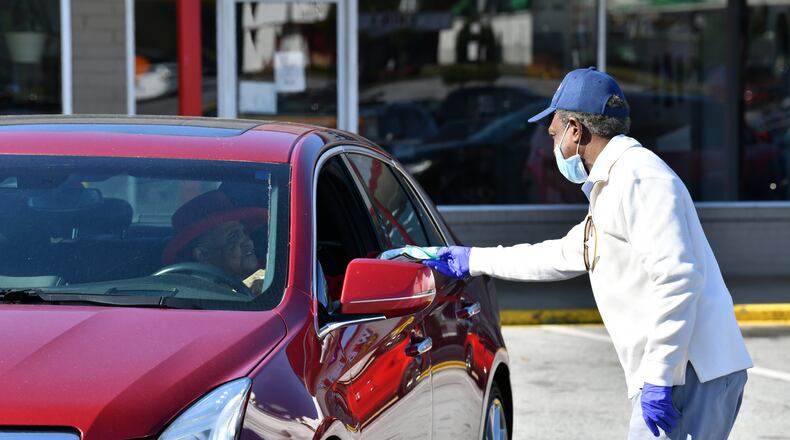DeKalb County commissioners have tweaked their ordinance that requires people to wear masks in public, adding a potential exemption for “conscientious objectors” and updating other language in hopes of avoiding a legal confrontation with the state.
DeKalb CEO Michael Thurmond proposed the changes. The county commission approved its original ordinance last week, but Thurmond had not signed it into law before Georgia Gov. Brian Kemp issued a new executive order explicitly banning local governments from requiring the use of face coverings.
Thurmond said he took the opportunity to gather fresh legal advice, and that the revised ordinance recognizes the governor’s authority while simultaneously asserting the powers afforded to local governments under the Home Rule Act of the Georgia Constitution.
The amended ordinance passed 6-1 on Tuesday. Nancy Jester, the commission’s sole Republican, voted no.
“I think it’s unfortunate that there’s been this narrative that local attempts to require masks is not consistent with the governor’s order,” Thurmond said.
The ordinance still requires that people wear masks in public places, with exemptions for things like outdoor exercise, driving and people with underlying health issues. First-time violators will still be given a warning.
Second-time violators will now be ordered to attend a COVID-19 education class. The $250 fine previously proposed for repeat offenders will now be administered only if they don’t attend the class, either virtually or in-person.
The ordinance also encourages local businesses to adopt “no mask, no service” policies and sets aside 20,000 masks for business that agree to implement them.
The most interesting addition, though, is a possible exemption for “conscientious objectors.”
Thurmond said anyone with “moral, ethical or religious” objections to wearing a mask will be permitted to submit a sworn affidavit for consideration by a local judge. If the judge finds the objections valid, the person could be relieved of any penalties.
A mandate for such objectors to also attend COVID-19 prevention classes was added, at the suggestion of commissioners Kathie Gannon and Jeff Rader.
“The [masking] requirement is not one that is intended to impose any sort of moral imperative on anyone,” Rader said. “This is a well-documented action that will measurably reduce the measure of this virus. And it’s not an abstract notion that it does so.”
Thurmond agreed, but said the changes adopted Tuesday provided “balance.” Commissioner Mereda Davis Johnson, who crafted the original ordinance, said she was “very much amenable” to the changes.
“We want an ordinance that will stand legal muster,” Thurmond said. “It’s not so much what I think and how I feel.”
Kemp’s office filed a lawsuit last week against Atlanta Mayor Keisha Lance Bottoms and her City Council counterparts, accusing them of violating the governor’s executive orders by banning gatherings of more than 10 people on city property and requiring residents and visitors to wear masks.
The parties were scheduled to appear in court Tuesday morning but the hearing was postponed after Fulton County Superior Court Judge Kelly Ellerbe recused herself.
The Georgia Municipal Association later filed a brief opposing Kemp’s lawsuit, using the same home rule argument Thurmond referenced when defending DeKalb’s masking ordinance.
The Home Rule Act allows counties and cities to adopt ordinances and regulations not addressed by the state. Kemp has maintained that broad powers afforded him under states of emergency -- like the one he’s declared during the coronavirus pandemic -- include the ability to bar local governments from enforcing rules that are more or less restrictive than his own.
“There is no indication in Georgia law that the governor has the power to suspend Home Rule, even during an emergency,” the municipal association’s brief said.
About the Author
The Latest
Featured



